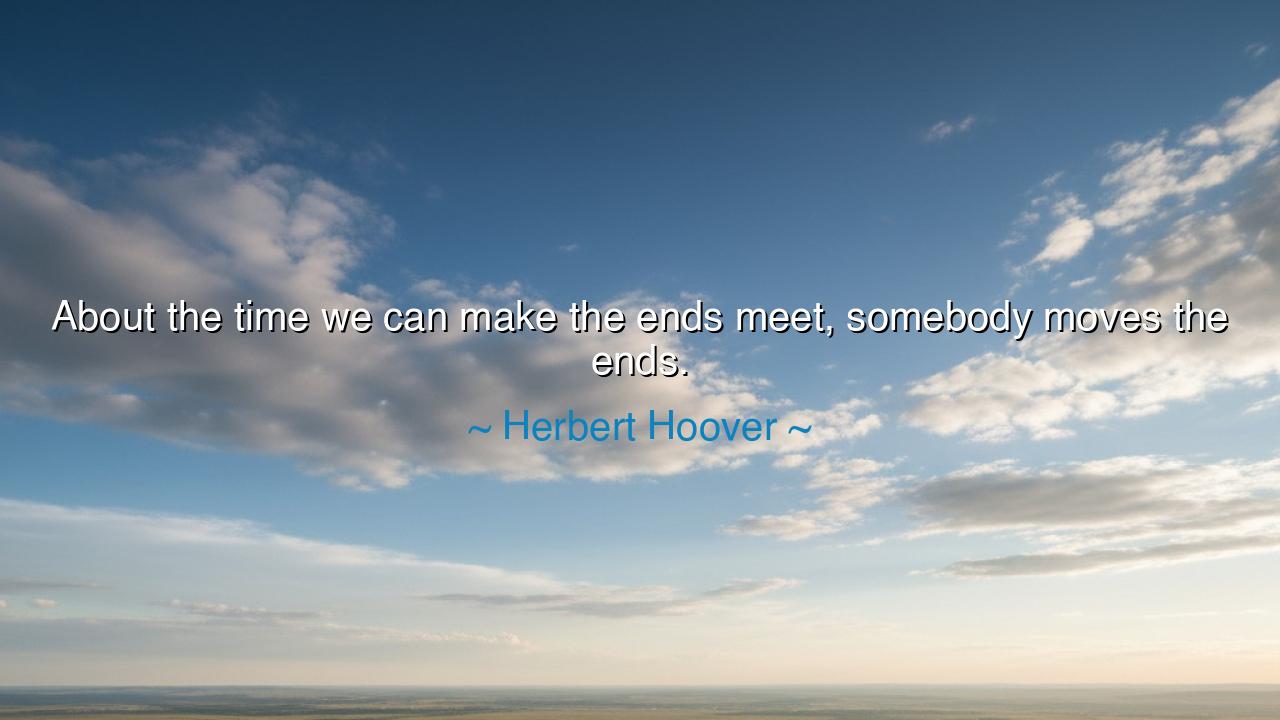
About the time we can make the ends meet, somebody moves the






The words of Herbert Hoover—“About the time we can make the ends meet, somebody moves the ends.”—are not merely a wry jest, but a lament born of human struggle. They capture the eternal plight of those who labor tirelessly, who stretch their hands to balance duty and survival, only to find that the world shifts just as they gain their footing. Life, with its unpredictable turns, often mocks our careful planning. Just when we believe we have grasped stability, new burdens arise, new costs are added, new expectations weigh upon our shoulders. Hoover, who witnessed both prosperity and depression, spoke from the vantage point of one who knew how fleeting security can be.
The ancients, too, would have recognized this truth. In the Book of Ecclesiastes, it is written: “The race is not to the swift, nor the battle to the strong, nor bread to the wise… but time and chance happeneth to them all.” The author saw, as Hoover did centuries later, that men may labor with diligence and yet find themselves defeated by forces beyond their control. The “ends” we seek to join—our needs, our duties, our ambitions—are often shifted by unseen hands: war, famine, injustice, or the whims of fortune.
History offers us striking examples. During the Great Depression, countless families fought to survive. Farmers who once harvested abundance saw their crops wither under drought; workers who once held secure jobs saw factories close overnight. They had made the ends meet, but then the ends were moved by economic collapse. Hoover himself, though remembered with criticism for his presidency during this crisis, gave voice to the bitter truth that so many endured: stability is fragile, and even the strongest efforts may be swept away by the shifting tides of circumstance.
And yet, this truth is not one of despair alone. It is also a call to resilience. If the ends of life are forever shifting, then the wise must learn not only to work hard, but to adapt. Consider the story of Abraham Lincoln, who faced repeated business failures, electoral defeats, and personal loss. Each time he thought he had secured his footing, the ends moved again. Yet he adjusted, he endured, and through persistence he rose to lead his nation through its greatest trial. His life shows us that though the ends may move, determination can still bridge the gap.
Beloved listener, the meaning is plain: the world will not always be fair, nor will it always remain still. You will reach moments when your efforts seem enough, only to discover that the goal has shifted beyond your reach. But do not despair. This is the nature of life itself. What matters is not only how you stretch to meet the ends, but how you respond when they move. To surrender is to be broken. To rise again, to adjust, to endure—this is the path of strength.
The lesson for us is simple but vital: expect change, and prepare your spirit for it. Do not rest in the illusion that stability, once achieved, will last forever. Build resilience into your heart, and flexibility into your plans. Save when you can, learn continually, and cultivate inner strength, for these will sustain you when the ends shift again. And above all, lean on community, for when one person falters, others may help bridge the gap.
So let Hoover’s words be remembered: “About the time we can make the ends meet, somebody moves the ends.” Take them not only as a complaint, but as a charge to live with endurance. For the ends will always move—that is the law of time and chance. But if you keep your courage, if you rise with every shift, then you will not only endure, but triumph—not by fixing the ends forever, but by mastering the art of moving with them.






AAdministratorAdministrator
Welcome, honored guests. Please leave a comment, we will respond soon